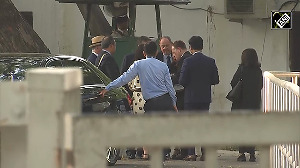The change of the prime minister's media advisor may be about the new power equation in the PMO.
The Congress party's view may get greater weightage in the government's decision-making processes than has been the case so far in UPA-II, says Neerja Chowdhury.
The induction of former NDTV senior editor Pankaj Pachauri as communications advisor in the Prime Minister's Office and media advisor Harish Khare's equally sudden resignation are signs that other changes may be afoot.
The PMO has seen many print journalists as media advisors: Sudheendra Kulkarni, H K Dua, Ashok Tandon and Sanjaya Baru. This is the first time the PMO will have a television journalist as communication advisor, and this is one of the signs of the changing times.
In the first hours after the news arrived, it seemed the soft spoken Pachauri, who is known for his professionalism and the research he invested into his stories, was being inducted to add value to the government's media management, and handle television journalists, the Hindi media and the social media which was successfully used by the Anna Hazare movement.
Law Minister Salman Khurshid has admitted how effectively Team Anna used tools like SMS, Facebook, Twitter, blogs -- something the government never thought of doing.
In recent months, the government's 'handling' of the media has come in for severe criticism as the United Progressive Alliance was pushed into a corner with scam after scam tumbling out and the government unable to get on top of a situation.
With the television news channels on the rampage, there were repeated demands in the Union Cabinet for the regulation of the media which is growing all powerful, and often not accountable.
There were murmurings of dissatisfaction on Raisina Hill with Khare, who had been a print journalist for years, recognised for his sterling qualities. When the change came in the PMO, those in the know said they had expected it much earlier!
Clearly with Pachauri reporting directly to Pulok Chatterji, the principal secretary to the prime minister, unlike Khare, who worked directly under the prime minister, the change of guard is more about Chatterji's growing clout than about Pachauri's entry or Khare's exit.
Pachauri is obviously Chatterji's choice; the principal secretary seems to enjoy a comfort level with the former NDTV editor. That no one really had wind of what was in the pipeline, when the file would have moved through many hands, and this is an age when it is very difficult to keep things under wraps, shows that the decision probably involved very few people.
Khare was reportedly informed of the decision on the morning of the day it was announced. His resignation within hours showed that he was neither happy with it nor willing to continue with the new entrant.
The prime minister's principal secretary, who took over last October, is a confidante of the Nehru-Gandhi family ever since he was posted as a collector in Amethi. He was expected to become Cabinet secretary last year when K M Chandrashekar retired, but that did not happen, probably because Sonia Gandhi did not want to court another controversy at a time when the government was really beleagured.
Instead, he took over as principal secretary to the prime minister, replacing the all powerful T K A Nair who had reigned supreme at the PMO, looking after a wide range of decisions for Dr Manmohan Singh, particularly after the latter's heart surgery in January 2009. Nair has now been designated an advisor to the prime minister.
Chatterji has had direct access to 10, Janpath, ever since the days when he was at the Rajiv Gandhi Foundation and secretary to Sonia Gandhi when she was the Leader of the opposition during the National Democratic Alliance rule. He is expected once again to play the role of the bridge between the government and the Congress party, to bring a new grip over governance.
He had played this role in UPA-I when he was a joint secretary and then a secretary posted in the PMO. He was a regular visitor at 10, Janpath, keeping the UPA chairperson in the loop about the goings on in government. In the last two years this is a role played essentially by Ahmed Patel, the Congress president's political secretary, even more after Prithviraj Chavan left for Mumbai to take over as chief minister of Maharashtra.
All of last year, there have been differences between the party and the government on a host of issues, whether it was the handling of the Hazare agitation, the constitution of the joint drafting committee for the Lokpal Bill, or Hazare's arrest or the four-member ministerial delegation receiving Baba Ramdev at Delhi airport, or the midnight action against him.
One reason why the Congress has been on the back foot is the lack of cohesion that has existed between the government and the party and also inside the government (the tussle between Finance Minister Pranab Mukherjee and Home Minister P Chidambaram continues and has resurfaced on the issue of Unique Identity Numbers).
When he was appointed media advisor, Khare was seen not as the choice of either the prime minister -- Sanjaya Baru, Dr Singh's media advisor in UPA-I, was his choice -- or of Sonia Gandhi, though both endorsed it. But Khare had Ahmed Patel's backing.
Does Khare's exit -- and Pachauri's entry -- mean that new power equations are in the offing now?
Given his position, even ministers have come calling on Ahmed Patel. But Patel would come to the PMO to meet with Chatterji during UPA-I.
The change of media advisor may also be about the changing power balance in the PMO. The party's view may once again get greater weightage in the government's decision-making processes than had been so far the case in UPA-II.
This is not without significance, coming as it does amidst speculation about the 'larger' role Rahul Gandhi may play in the months to come. That larger role may have more to do with having a say in decision-making at various levels than about him acquiring a new designation in the government or in the party.
So Dr Manmohan Singh may continue as prime minister and Sonia Gandhi as Congress president, but a new set-up may be getting ready behind the scenes for Rahul Gandhi.







